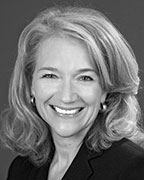
Innovation in Infrastructure
An Interview with Anne Ellis, P.E., of AECOM
A director at AECOM, a global firm that builds, finances and operates diverse types of infrastructure, Anne Ellis, P.E., talks about her work in innovation and knowledge sharing.
What are your current priorities in your role with AECOM? How is that role changing with the integration of URS Corp. into AECOM?
Now that URS and AECOM have combined, the firm has almost 100,000 employees. AECOM operates in more than 150 countries on all seven continents, serving about 25,000 clients. The company is a powerhouse of ideas, knowledge and innovation. Our people are involved in all types of innovations: technical, social, organizational and more. Innovation is not just about high technology products but also service solutions with transformational impacts that can be systematically reproduced in other cases or environments.
Consider London's innovative approach to use its Olympic and Paralympic infrastructure investment to regenerate East London - the "Legacy Communities Scheme." AECOM led the development and testing of the scheme – a transformative model for other cities contemplating similar expenditures. AECOM CEO Mike Burke recognizes the value of our capacity for innovations such as this and is investing in capturing the "mind share," or employees' technical expertise, deployed - no matter where it resides - and delivering it to our employees and our clients around the world.
As AECOM's director of innovation and knowledge sharing, I manage the people and processes that build and support a company-wide forum to capture and redeploy our people's knowledge, or "mind share." The forum enables our employees to exchange thoughts about what works, share their successes, and tell the stories of our clients' achievements. And, I must say, the passion our employees possess for innovation and perseverance to succeed is inspiring.
How do standards help to open markets or act as technical barriers in areas of the world important to your company?
At AECOM, we look for new and better ways to deliver our expertise through innovative solutions that enable each client to realize their vision. We want to bring forward the best, most current and innovative ideas, technologies and solutions. Currently, we serve clients in more than 150 countries. Absence of recognition in codes and standards in the market where we are operating may slow or block access to new and often innovative technologies and approaches. In addition, the recognition that comes with having codes and standards can accelerate the process of bringing technologies to market.
What challenges do you see in the future for infrastructure development and maintenance? How will standards help with these challenges?
Globally, a significant challenge is financing the design, building and operation of infrastructure that serves the collective good. Innovative strategies for financing and managing infrastructure offer alternative mechanisms, including those involving the private sector. Standards - financial, construction, testing, technical - are essential to ensure access to these mechanisms. Whatever the financial mechanism, standards aid the quality and performance essential to achieving good returns on infrastructure investments.
What were some of the changes you helped oversee as president of the American Concrete Institute?
ACI, founded in 1904, grew and took shape along with the development of our nation's vast infrastructure systems that were created in the 20th century. As we entered the 21st century, the ACI leadership recognized the need to adapt our vision, mission and strategic pillars to a rapidly changing world.
ACI embraced, among other things, globalization, sustainability, social technologies and the digital world through tactics such as refreshing its brand, which included retiring a 50-year-old logo and repurposing its Internet presence to address commerce, collaboration and communication worldwide. In addition, ACI embraced social media – connecting a global community with shared passions and interests. And, building on its diverse and global membership, the group expanded its outreach and visibility outside of the Americas.
At AECOM you have responsibility for the Global Advisory Board. What does this work involve and what is its relevance for your company?
AECOM operates in more than 150 countries. The firm's advisers provide valuable perspectives as we advance AECOM's diversified global growth strategy in areas such as entering new countries and connecting with key decision makers globally. These advisers share expert knowledge of issues at the intersection of global business and society at large, including humanitarian affairs, socially responsible business practices and sustainability. I have the privilege of facilitating the advisers' engagement with AECOM executive leaders, clients and stakeholders.
Anne Ellis, P.E., is director of innovation and knowledge sharing for AECOM, Washington, D.C. A fellow of the American Concrete Institute and the American Society of Civil Engineers, Ellis recently served as ACI president. By appointment of the U.S. Secretary of Commerce, Ellis serves on the Environmental Technologies Trade Advisory Committee, which provides consensus advice on the development and administration of programs and policies to expand U.S. exports of environmental technologies, goods, services and products that comply with U.S. environmental, safety and related requirements. Ellis is a licensed professional engineer with more than 30 years of experience with the architecture, engineering and construction industries.
 SN Home
SN Home Archive
Archive Advertisers
Advertisers Masthead
Masthead RateCard
RateCard Subscribe
Subscribe Email Editor
Email Editor